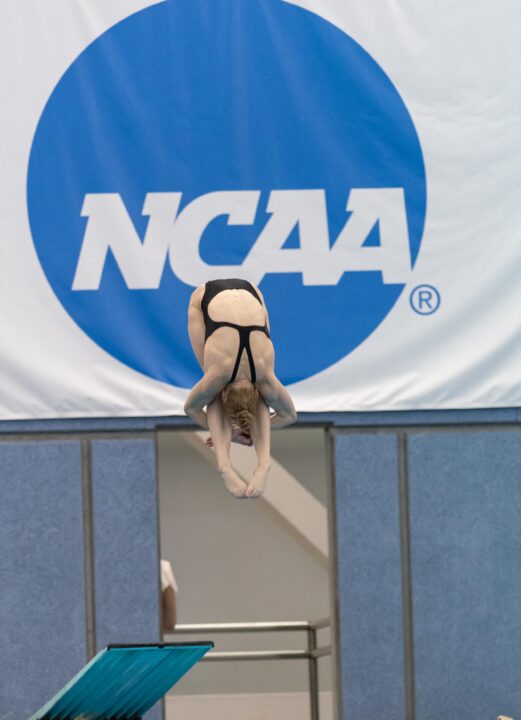Courtesy: Dr. Chelsea Ale, President of the U.S. Professional Diving Coaches Association
Opinions in this op-ed don’t necessarily reflect the views of SwimSwam.
On June 6, 2025, the House v. NCAA settlement was officially approved, a historic $2.8 billion agreement that forever alters the landscape of college sports. It’s being hailed as a win for college athletes. And in many ways, it is.
But for sports like swimming and diving, it’s a red-alert moment.
Under this new agreement, schools can begin directly compensating athletes, up to $20.5 million annually per institution, starting July 1. The payments are optional but highly incentivized, especially at the Power Four level. At the same time, the old scholarship limits are gone. In their place? Roster caps. Suddenly, swimming and diving, which historically carry large rosters with a mix of scholarship and walk-on athletes, are at serious risk of being downsized, defunded, or cut altogether.
It’s not just a budget issue. It’s an identity crisis for Olympic sports in college athletics.
What Does This Mean for Our Athletes?
For decades, college swimming and diving have served as the backbone of U.S. Olympic success. These programs have given thousands of athletes the chance to pursue excellence, not just in sport, but in life.
Now, those opportunities are in jeopardy.
Athletes who dreamed of competing in college may soon find that doors are closing. Teams may shrink to meet new financial realities. Some programs may disappear entirely. And for those who remain, the pressure to perform — both athletically and financially — will only increase.
We’re asking 18- to 22-year-olds to become content creators, fundraisers, and brand ambassadors, just to justify their spot on the team.
But what about the walk-ons — the ones who came in with no scholarship, who worked their way up through sheer grit and access to high-level coaching, resources, and teammates, and became NCAA finalists and champions? Under this new model, that story disappears. If you’re not elite when you walk in the door, your chances of ever getting that opportunity are vanishing.
This also changes the way coaches recruit and develop talent. It’s no longer about seeing potential and building someone up over four years. It’s about selecting ready-made stars. And if you’re not already there, someone else will take your spot — because the roster can only stretch so far, and every slot comes at a cost.
And what happens to the athletes who planned to redshirt? Who needed that extra year to pursue Olympic dreams or recover from injury? In this new system, redshirting may no longer be an option. Coaches can’t afford to hold a roster spot for someone not producing points, not when every seat on the bus is scrutinized. No team has a perfect season. Someone always gets hurt. Someone always gets in trouble. Someone needs time to grow. Without depth, what happens when it’s time for conference or NCAAs and the team is short?
I heard a coach say recently, “Thank goodness my diver made NCAAs, or I would have had to cut them.” Let that sink in. Not because the athlete wasn’t working hard. Not because they weren’t part of the team culture. But because in this new reality, simply being a valuable member of a team isn’t enough.
Coaches are now faced with gut-wrenching decisions. They have to remove athletes who are amazing additions to the team culture and climate simply because they aren’t the “winners.” But if you’ve ever been part of a team, you know that some of the most impactful people are not always your top scorers. They’re the leaders. The motivators. The glue that holds the team together. The ones who push others to be better. The ones who make the grind bearable. In this model, there’s no room to keep someone because they’re a great teammate, only if they’re producing results on paper. How does that affect the culture of a team? What happens to loyalty, leadership, and long-term development?
Now, more than ever, athletes will be fighting daily to keep their spot on a team they love. No one has a perfect season every season. We all have ups and downs. But this system leaves no room for growth. If you have a bad meet, a rough stretch, or need time to recover, your spot can be taken. Quickly. And permanently.
What About Coaches and Programs?
Coaches are already seeing the writing on the wall. They’re being told to “do more with less”, less funding, fewer roster spots, and more uncertainty. And many are now being asked to supplement their programs through fundraising, grants, and community engagement just to stay afloat.
Athletic departments are being forced to make impossible choices. And when faced with the question of how to fund a $20 million revenue-sharing model, it’s often non-revenue sports that are the first on the chopping block.
We’re not just talking about small schools. We’re seeing warning signs at major universities. Programs that once felt secure are suddenly vulnerable.
What Needs to Happen Now
We can’t sit back and hope this works itself out. The settlement has passed. The model is changing. What we do next will determine whether our sports survive.
Here’s what we must do:
1. Mobilize and Advocate Loudly and Relentlessly
Athletic directors, university presidents, and conference commissioners need to hear from us — coaches, athletes, alumni, and parents. We must show them the value of these programs and why they’re worth preserving. Visibility matters more than ever.
2. Fund Strategically and Creatively
If athletic departments are stretched thin, then Olympic sports need new revenue models. Foundations, booster clubs, and alumni collectives should be activated or created now. We need to take control of our own sustainability.
3. Build Partnerships Across Programs and with the USOPC
Swimming and diving, along with track, gymnastics, wrestling, tennis, and others, should work together. We are stronger when we speak with one voice. Whether it’s lobbying the NCAA or coordinating joint fundraising efforts, collaboration is key. But we also must begin working more directly with the U.S. Olympic & Paralympic Committee and our national governing bodies. If college programs disappear, many of these NGBs simply do not have the resources to replace the development pipeline. College sports are not just a luxury; they are the foundation of America’s Olympic success.
4. Embrace NIL in Sport-Specific Ways
We need to help our athletes succeed in the NIL era, not just survive it. That means training them to build their brands, monetize their expertise (through camps, lessons, content), and connect with companies that align with Olympic values — even if they don’t play in sold-out arenas.
The Bottom Line
This isn’t just about money. It’s about preserving access, opportunity, and excellence.
If we allow Olympic sports to wither under this new model, we lose more than teams. We lose the very foundation of what collegiate athletics can be: a place where hard work, not TV ratings, earns you a lane in the pool or a chance on the board.
We don’t have time to wait. The future is already here.
And if we want to keep swimming and diving in it, we have to fight for it.
ABOUT DR. CHELSEA ALE
Dr. Chelsea Ale is the President of the U.S. Professional Diving Coaches Association and a professor of Sport Management at the University of Alabama. A former Division I diving coach and athlete, she advocates for the preservation of Olympic and non-revenue sports through strategic leadership, athlete-centered policy, and sustainable funding models.


If the minimum number of NCAA sports on campus are reduced or eliminated, Olympic sports are gone.
Thank you for this article which explains the impacts of the NCAA settlement on olympic sports in a clear and succinct way.
Dr Ale is a forward thinker and spot on in her assessments. Thank you for the amazing analysis!
She is a dive supporter MigBike, maybe you have also come to the dark side?